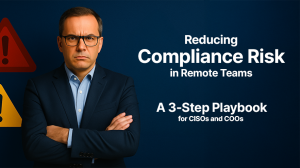Table of Contents
Outsourcing is a strategic move that improves efficiency, agility, and innovation in the modern business landscape. Businesses focus on two types of outsourcing, BPO and KPO, based on the nature and objective.
B2B enterprises must choose between BPO vs KPO based on their goals. BPO offers process-driven services like customer care and payroll processing.
KPO is outsourcing knowledge-intensive work, such as legal research, data analytics, and financial modeling, and provides strategic value through specialized knowledge.
Understanding these distinctions is critical for corporate executives seeking to connect outsourcing tactics to long-term objectives.
Understanding the differences between BPO vs KPO is crucial to making scalable decisions.
What is BPO and How Does It Help Businesses?
It refers to engaging a third-party service provider to handle specific business activities or functions that are typically non-core but critical to the organization. It provides customer service, technical support, data input, payroll processing, and human resources services.
In 2025, the global BPO marketplace is US$ 414.81 billion and is forecasted with a CAGR of 4.3% from 2025-29.
BPO decreases operating expenses, increases efficiency, and focuses on its core capabilities. It is used in industries such as retail and healthcare to handle large-scale support operations.
A telecommunications business may outsource to serve consumers around the clock without an in-house call center, saving on infrastructure and training costs.
What is KPO and How Does It Help Businesses?
KPO provides skill-based jobs, such as market trends and financial analysis. They resolve complex issues and assist companies with strategic decision-making.
KPO reduces the cost of running a business and contributes valuable expertise through expert guidance and creativity. These experts can offer detailed market research and investment information, allowing the company to make informed portfolio choices.
Top 10 Differences Between BPO vs KPO
Nature of Operation
BPO focuses on process-driven, repetitive work, including customer service, back-office assistance, data entry, and transaction processing. The goal is to streamline daily company activities and reduce operational costs.
In contrast, KPO is knowledge-based, and complex procedures include legal research, corporate analytics, and financial consultancy. These duties necessitate competence and decision-making abilities. KPO creates value, whereas BPO focuses on efficiency.
Businesses trying to optimize operations often use BPO, whereas those seeking insights and innovation use KPO. For example, a retail corporation may outsource billing processes to a BPO while hiring a KPO for market research to guide strategic expansion.
Skill Level
Most jobs may require short-term training and do not require industry-specific knowledge. It facilitates the speedy onboarding of huge teams.
KPO requires a higher level of education and domain knowledge. Employees in KPO roles sometimes have graduate degrees in finance, law, engineering, or IT.
For example, a BPO agent may assist with consumer inquiries, but a KPO analyst may conduct stock research or analyze legal documentation.
Decision-Making Involvement
BPO teams often adhere to preset workflows and scripts, with minimal decision-making involved. They carry out customer instructions as accurately and efficiently as possible.
In contrast, KPO specialists examine data, understand insights, and offer decision-making suggestions. Their work contributes to strategic corporate decisions.
For example, a BPO call center executive may answer inquiries using traditional procedures, whereas a KPO team may study client feedback to recommend product changes.
Client Engagement
In BPO, the client monitors the entire process, from workflows to KPIs. Communication is transactional and task-oriented.
KPO necessitates a more collaborative strategy. Clients frequently collaborate with KPO teams to share expertise, business objectives, and expectations.
A company that outsources payroll to a BPO transmits data and expects it to be processed efficiently. KPO financial modeling will address goals, assumptions, and long-term plans with the provider. It makes KPO a better fit for businesses requiring advisory support and long-term relationships, whereas BPO is better suited to companies looking for execution efficiency.
Cost Effectiveness
BPO is cost-effective, particularly for high-volume, repetitive tasks. Businesses can save money on infrastructure, training, and remote staffing.
KPO, while cheaper than in-house hiring, is more expensive due to the requirement for experienced personnel and bespoke services.
Outsourcing 24/7 customer assistance to a BPO business can significantly reduce expenses, whereas employing a KPO firm for patent research is more expensive but provides strategic and legal benefits.
B2B decision-makers must measure short-term savings against long-term value when deciding between BPO and KPO.
Training Requirement
Training in BPO workplaces is frequently uniform and efficient, and most employees learn processes, scripts, and tools within a few weeks.
KPO training is more rigorous and specific to the domain. Employees frequently require a solid foundation in industry-specific knowledge before going for client work.

wAnywhere works with both BPOs and KPOs to ensure secure, compliant, and visible operations.
Complexity of Tasks
Tasks in BPO are typically repetitive, rule-based, and standardized, such as processing bills or addressing consumer questions. They need precision and quickness, but little problem-solving.
KPO assignments are typically complex and unstructured, requiring extensive study, strategic thinking, and data analysis. A KPO may handle competitive intelligence reports or financial forecasts with extensive analysis skills. It makes KPO better suited to banking, law, and healthcare, where insights drive value.
Industry Served
BPOs serve businesses that require frequent client interactions and back-office operations, such as telecom, retail, healthcare assistance, banking, and logistics.
KPO serves pharmaceuticals, law, financial services, information technology, and engineering.
For example, a bank may use a BPO to handle customer account inquiries, but a KPO for risk analysis or compliance audits. Understanding which sectors benefit from each model can help companies select the best provider and achieve consistent service outcomes.
Performance Metric
Efficiency metrics, such as call resolution time, accuracy rate, and number of transactions processed, are commonly used to assess BPO performance.
KPO performance prioritizes quality, insight, and impact. Metrics may include analytical correctness, strategic relevance of recommendations, or improvement in business outcomes.
Role in Business Scalability
BPO helps organizations increase operations quickly without investing substantially in infrastructure or labor. It is ideal for firms that want to expand by managing more volume without disrupting internal workers.
Read more: Call Center Management
KPO Vs BPO: Which Suits Best for Your Business Objectives
The industry and the objective of a company determine whether you should use KPO or BPO.
Businesses seeking to reduce expenses, increase efficiency, and outsource repetitive jobs, BPO to be the appropriate fit. It is ideal for services, like customer support, data entry, and payroll processing, where speed, volume, and consistency are critical.
If your company needs specialist insights, extensive research, and strategic thinking, KPO is a superior option. Industries, such as banking, legal, healthcare, and IT, frequently rely on KPO for data analytics, legal advising, and technical research.
Read more: Call Center Cost Savings
Conclusion
Deciding between BPO vs KPO will depend on your business objectives. BPO is best suited for high-volume, process-based activities such as customer support and payroll, whereas KPO provides data-driven decision-making through research, analytics, and domain expertise.
To put it in simple words, if you want to outsource tasks that are mundane, general, or don’t require any deep expertise, a BPO service is the best option for you. On the other hand, when you want to automate tasks that demand deep technical, analytical, and specialized knowledge, you should look for a KPO service provider.
No matter which you choose, you’re entrusting sensitive business data — like PII, PHI financials, or credentials — to a third-party. And with 61% of enterprises experiencing data breaches tied to outsourcing, it’s crucial to evaluate the security practices of any BPO or KPO partner.
Therefore, while hiring a KPO or BPO, always assess what measures these organizations take to ensure compliance security for your confidential data. Moreover, learn about their data loss prevention (DLP) strategies to ensure your data stays in safe hands.
If you are running a BPO or KPO organization, wAnywhere can help you to build secure third-party operations with features like PII masking, activity tracking, AI-powered threat detection, and automated incident response. It ensures your outsourced workflows stay compliant, monitored, and breach-resistant—helping you gain trust of your clients by protecting their data.

Run a BPO or KPO? Keep client data safe and trusted
wAnywhere’s AI-powered compliance and productivity solutions help outsourcing providers deliver performance and peace of mind.












